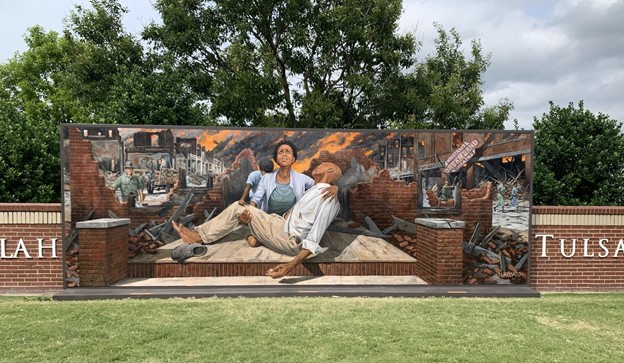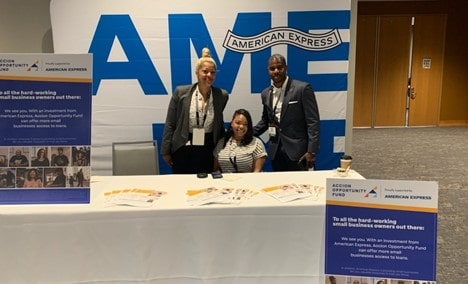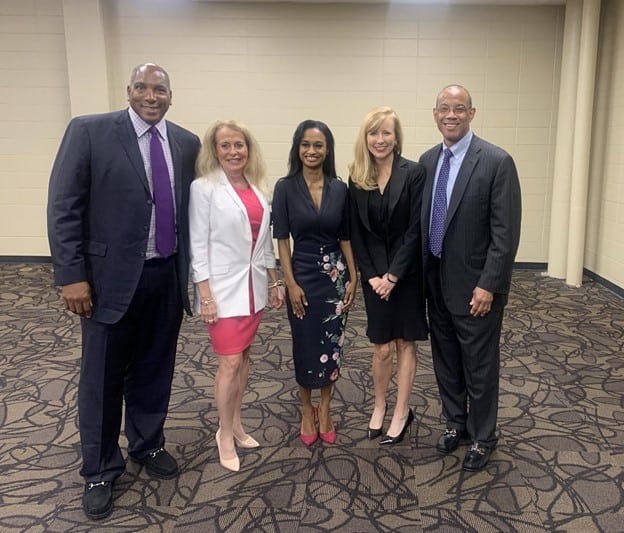Facing a year of racial reckoning
A little over a year ago, protests broke out all over the world after the murder of George Floyd. What started as outrage over one man’s death exploded into an international call for accountability, racial justice, and an end to police brutality.

So, who answered that call? Many large corporations vowed to support #BlackLivesMatter, including pledging over $50 billion to racial equity initiatives. Local governments met to discuss police reform and reparations. But many of us asked ourselves the big question: Would promises and hashtags translate into real change?
At Accion Opportunity Fund, we’ve been examining our role in the broader movement for racial justice. We believe that an inclusive financial system is a cornerstone of a vibrant society. Accordingly, we strive to support Black entrepreneurs by developing impactful loans and resources, building partnerships, advocating for policy changes, and working to ensure we’re honoring small business owners’ experiences and leadership every step of the way. We’re also embarking on a research-based assessment of racial justice, diversity, inclusion, belonging, and equity at our organization, since our workplace culture must reflect our vision of a more just world.
As we honor Juneteenth, we wanted to share an update on our progress from this past year, while humbly acknowledging the vast and vital work that lies ahead for both our organization and our society.

Accion Opportunity Fund staff: Latesha Williams, Kristin Grubbs, Hanif Jainlett (left to right)
Remember and Rise: Attending Tulsa’s Economic Empowerment Day
Earlier this month, our partner American Express invited Accion Opportunity Fund to join the centennial commemoration of the Tulsa Race Massacre, including an Economic Empowerment Day. Four Accion Opportunity Fund staff members attended—Latesha Williams, Kristin Grubbs, Hanif Jainlett, and Luz Urrutia.
Multiple centennial events memorialized victims of the 1921 massacre, which devastated the nation’s “Black Wall Street”. Economic Empowerment Day also honored the legacy that today’s Black entrepreneurs carry on, in Tulsa’s Greenwood district and beyond. Hanif Jainlett, Director of Accion Opportunity Fund’s Project Management Office, reflects that the event presented valuable opportunities to network with entrepreneurs and financial executives, laying the groundwork for new partnerships. Accion Opportunity Fund CEO Luz Urrutia spoke on a panel addressing the Importance of Black Entrepreneurship in Shaping Communities.
As a woman of color herself, Luz recognizes how important it is to both stand up to injustice and stand back to let often-unheard voices shine. “I was delighted to be a part of Economic Empowerment Day because, at Accion Opportunity Fund, we envision an inclusive world where all determined entrepreneurs and communities have the resources they need to make their dreams come true. Accelerating progress toward financial inclusion that better serves entrepreneurs of color, women and immigrants, is critical to addressing long standing inequities that hold us back as families, neighbors, and a nation. Creating an inclusive and equitable financial system won’t be solved by one single organization. It will take the collective efforts of all of us working together.”
In Tulsa, AOF staff took a sobering walk through the streets of Greenwood, the epicenter of the 1921 violence. It struck a tender nerve with Luz: “I imagined this thriving Black entrepreneurship community – 40 blocks with more than 70 prospering businesses. The most striking thing to me was that, after the riots, the only building left standing in this neighborhood was the church.

Earl “Butch” Graves, President & CEO, Black Enterprise Magazine; Luz Urrutia, CEO Accion Opportunity Fund; Racquel Odeon, Head of National Sales for Chase Consumer Banking, JP Morgan Chase; Ginger Kollman, Tulsa Market Leader, JP Morgan Chase; John Rogers, Chairman, Co-CEO & Chief Investment Officer, Ariel Investments (Left to Right)
“Here was the foundation to build intergenerational wealth—which is the wonderful legacy of family-owned businesses. And in only two days everything was cruelly ripped away. Too many lives were met with an undeserved early end and descendants were robbed of intergenerational prosperity, health and community. What happened in 1921 was never called out. It was a massacre, plain and simple. It made me wonder—how many more Tulsas are there that aren’t talked about?” -Luz Urrutia, Accion Opportunity Fund CEO
How can we do better?
Over this past year, facing COVID-19, ongoing police brutality against Black communities, and the centennial of the Tulsa Race Massacre, we at Accion Opportunity Fund questioned ourselves: What did we need to change to respond to the needs of Black small business owners?
Through our 27-year history, our work has centered primarily on the Latinx community. But we must do more to continue to serve all communities of color.
In the face of the devastation wrought by COVID-19, we knew that our organization’s status quo was not going to achieve the impact communities deserve.
As Luz shared in July, 2020, “We have to decide what we want our Main Streets to look like when this is over. And we must act decisively. We have an opportunity here to build back something better than we had before by accelerating investments in Black entrepreneurs.”
In the past year, we’ve built the following partnerships and initiatives, to better support Black-owned businesses:
- Partnerships:
- Our Sales and Partnerships team continues to deepen its relationships with Black Chambers of Commerce as trusted partners in reaching Black small business owners, including the Silicon Valley Black Chamber of Commerce, San Francisco African American Chamber of Commerce, Oakland Black Chamber and many other local and national organizations focused on supporting Black small business owners.
- Additionally, we are part of the Advisory Council of the Los Angeles County Initiative for Inclusive Small Businesses, supporting the Los Angeles County small business ecosystem for small business owners of color, as well as the Steering Committee for the California Small Business Coalition for Racial Justice.
- Projects:
- Board members and donors have formed In the Black: Bold Leaders for Black Enterprises, a network out to catalyze inclusive entrepreneurship across the country. Their collective work and philanthropy powers discourse and connectivity towards the growth of Black small business ownership. The group is focused on the designing and deployment of new financial products and educational tools to scale Black businesses. Initially, the group will focus on encouraging corporations to invest in Black-owned companies.
- Lending and Advising:
- We are one of the community lenders deploying loans through the SOAR (Southern Opportunity and Resilience) Fund, which offers eligible small business owners and nonprofits across the South—home to dozens of cities with high concentrations of Black entrepreneurs—low-interest loans of up to $100,000 and free business support. We also joined the California Rebuilding Fund, which directs capital to historically under-banked areas of the state as part of an equitable economic recovery from COVID.
- Accion Opportunity Fund outpaced other Bay Area lenders in distributing Paycheck Protection Program loans to racially diverse communities, distributing 32% of PPP loans to areas with a high concentration of Black residents (San Francisco Chronicle).
- American Express invested $40MM in Accion Opportunity Fund to support women and business owners of color.
“In our roles at Accion Opportunity Fund, we have a responsibility to use our privilege and our platform to relentlessly seek economic justice and support the thriving of Black businesses. I ask all of us: what is our role in helping to leave this world a better place than we were given?” – Luz Urrutia, CEO, Accion Opportunity Fund
Looking forward
We implore you to educate yourself on the struggles that Black Americans have experienced historically and today, to quietly listen to unheard stories and unsung heroes, to acknowledge your own privilege and use it to help others, and to support community-based organizations working for racial justice.
To advance financial inclusion, we encourage you to support Black-owned businesses in your neighborhood. We invite your continued partnership in envisioning, and building, a more inclusive and just economic system.